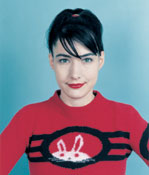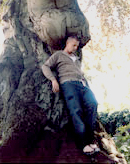 |
  |
 |
  |
 |
 |
| |

Read Bjork's2001 interview with Juergen Teller from the index archives. |

|
 |

Kathleen Hanna discusses writing and making music in this interview from 2000 with Laurie Weeks. |
|
 |
|
 |
|
|
 |

Isabella Rossellini spoke with Peter Halley in this 1999 interview. |
|
 |
|
|
 |
 |
|
Alexander McQueen's 2003 interview with Bjork. |
|
 |
|
|
 |
|

|
| Karen Black, 2004
WITH DAVAD SAVAGE
PHOTOGRAPHED BY HEATHER CANTRELL |

Karen has brought the same focus to her roles in such classics as Five Easy Pieces, Nashville, and Day of the Locust as she has to Burnt Offerings, Trilogy of Terror, and Airport 75. It's this devotion to her craft that bewitches indie writer-directors like Rob Zombie and Steve Balderson — who directed her in House of a Thousand Corpses and Firecracker, respectively — every bit as much as it did Altman, Hitchcock, and Schlesinger in the '70s. In 2003 alone, she finished seven films, in addition to touring with her own cabaret act. Much like her famed voluptuousness, Karen's cup runneth over, both professionally and personally. David spoke to Karen at her home in Los Angeles's San Fernando Valley one Saturday afternoon.
DAVID: I see Firecracker as your reunion film with Dennis Hopper, thirty-odd years after Easy Rider.
KAREN: I hear you, darling, but the truth is, he's not in it. [laughs]
DAVID: Oh no! Was his part cut out?
KAREN: I don't know. But I know that at some point Steve made both male leads into one actor, who is actually Mike Patton, the lead singer of this huge band, Faith No More.
I haven't talked to Dennis about it.
DAVID: Oh well, there goes my thesis.
KAREN: So, do you still want to interview me?
DAVID: I've been wanting to interview you for years! You play two roles in Firecracker. One is a mother whose son has been murdered, and the other is a
circus performer who comes to town.
KAREN: Yes, to Waumego, Kansas. A real murder was committed in the house where we filmed.
DAVID: Was that disturbing to you?
KAREN: It would have been if the house was spooky, but it wasn't. It was clean.
DAVID: The two characters you play are almost opposites.
KAREN: You have these two different worlds. The people who are good are very, very good, and the people who are bad are very, very bad. It's like a fairy tale. One of my characters is a victim, a victimized woman. She is passed around by the person that was to have been played by Dennis Hopper, but is now Mike Patton. She is the mother of two boys, one of whom is murdered. She is completely hooked into her notions of the Lord and her rosary. In a sense, she is building a dream world that allows her to backpedal out of the hideous drama occurring in her own household. She has white hair and funny curlers and putters about when she walks.
DAVID: And the other character?
KAREN: The circus performer is scarred. That's why she's in the circus. I wrote a background for her. She's an intelligent woman. I gave her a lot of my own mind when I played her. She's very bored with it all. She's beautiful. She has long brown hair, wears beautiful velvet robes, and sings in French. Want to hear the song?
DAVID: Please!
KAREN:[Begins singing in a mournful operatic voice] J'attendais toujours... j'attendais...
DAVID: Your voice is beautiful! It sounds like you've had training. Did you study singing?
KAREN:Thank you, David. As a teenager I studied opera, believe it or not. But I just couldn't catch on to it.
DAVID: You grew up in a musically prominent family, didn't you? Your grandfather was the famed German violinist Arthur Ziegler.
KAREN:Yes, he was a brilliant violinist.
DAVID: You are one of the hardest-working actresses in Hollywood.
KAREN: I don't know about that. I wouldn't make comparisons, but I sure work hard.
DAVID: You also work with many first-time writer-directors. Do you think you intimidate them?
KAREN:Absolutely not. I am the least intimidating person. I think I would have done better in my career if I were a little more intimidating. Even the maid who comes to work for me once a week has found out that she can just trample over me. She knows I won't complain because I'm fainthearted in that way. I'm a Cancer! We are not ferocious people.
DAVID: On screen, at least, you aggressively inhabit your characters. You trained in the Method with Lee Strasberg, didn't you?
KAREN: I went to Lee Strasberg's class. What I saw was everyone on stage saying to himself, "Do I believe me?" I don't think that is the question!
DAVID: Then how do you do it?
KAREN:I like to watch people. For example, people at the airport aren't saying to themselves, "Do I believe me?" What is interesting about them is that they don't know what they are like. People at airports are the most brilliant actors in the world, because their attention is elsewhere, and they are idiosyncratic. I like to imitate people. I walk behind them and imitate their backs.
DAVID: You played a transsexual in Robert Altman's Come Back to the Five and Dime, Jimmy Dean, Jimmy Dean. Was that a difficult role to inhabit, being a woman playing a man who had become a woman?
KAREN: So difficult. And I don't want to do it again. I had a lot of behavior to interiorize and make my own. I researched it for months. These women — I mean, let's face it, they are women — just want their bodies to be in accord with who they are. But they do it, and they discover it isn't working. There are many suicides. There is no pot of gold at the end
of the rainbow.
DAVID: Let's talk about Max and Grace, the film you did recently with Natasha Lyonne, which has been sent to Sundance.
KAREN: I play a woman who is clairvoyant but is thought to be mad, so she's put in a loony bin. Natasha and her boyfriend, played by David Krumholtz, break in and save me. It's kind of a road movie.
DAVID: I love it already. How did you develop your character?
KAREN: I interiorized clairvoyance. In character, my eyes are going to see something a
little different than what Karen sees. They are going to see lights around people, and they are going to see the actual level of malevolence and good-heartedness within each person. I took Natasha to the Braille Institute yesterday. She was here in town, and she is playing a blind person in Blade 4 or something. We have the same way of working, interiorizing your being.
DAVID: I want to ask you about your cabaret act, which I'm very interested in seeing. Talk about inhabiting characters!
KAREN: My cabaret act started long ago. Toni Basil and I were going to do something together, then we both got too busy. She liked the idea that I sing country-western in a guy's growl and "The Boy Next Door" in soprano.
DAVID: Well, you were completely possessed by that country-western character in Nashville. You performed your own song.
KAREN: In my act, I create three places on the stage. On the left, I have a bed where I do an old American folk song about this teenage girl who is pregnant, and then a Bessie Smith song about waking up in the morning and finding my lover gone. In the middle of the stage, I do show tunes. Then on the right of the stage, I do "Ten Cents a Dance" and "Cocaine Jane" from the '30s.
DAVID: Are these three characters all aspects of yourself?
KAREN: David, it is just like writing a character. If you can write it, I can be it.
DAVID: It is very similar, creating a character on paper and creating one as an actor.
KAREN: There is elegance in that, the elegance of the soul or spirit. I'm really just a
subject of my own imagination, which can go anywhere. I dislike when people try to pigeonhole me, when all I want is to do good work.
DAVID: What is the biggest misconception about you?
KAREN: That I am spooky or that I am arch. When I was filming in Kansas, all I thought about was wishing to be like a violinist. Why is a violinist spooky? Why is a violinist arch? The people at your magazine were trying to make me Old Hollywood. What, me? I just want to be like a violinist who works very hard because the performance has to be just right.
DAVID: What was behind your decision to do so many horror films?
KAREN: I was doing bad movies as a day job. And it almost ruined my life for a while. But I have done a hundred and thirty-odd films, and only fourteen have been spooky ones. I'm not spooky! I want life!
DAVID: Do you live a very natural, sunny, canyon lifestyle in LA?
KAREN: If you didn't know that I am an actress, I don't think you could tell from my lifestyle. I cook and cook and cook. I like to be with my daughter. She's sixteen so of course I bore her.
DAVID: And everything embarrasses her in public.
KAREN:Thank you. "What car are you coming in? Please, please don't pick me up in that car."
DAVID: And what kind of car is Karen Black driving?
KAREN: It is just a red convertible, a Chrysler.
DAVID: I bet it's a Le Baron. Hot!
KAREN: No, it's newer than that.
DAVID: Let me ask about your work with some of the great directors. When I mention a name, just say a few words about each one... Robert Altman.
KAREN: This is the image I always have of Robert — you take a hundred flowers, you throw them in the air, and you photograph where they land. You don't do it timidly. You do it with absolute certitude, and those flowers will fall in wonderful places. It came to me when we were doing Come Back to the Five and Dime.
DAVID: You costarred with Cher and Sandy Dennis.
SYLVIE: Robert said, "We don't have much money, you have to bring your sleeping bags and rest on the floor, but maybe this will be one of the greatest movies ever made." I knew that whatever we wanted to try, he would probably not only allow it, but embrace it.
DAVID: Alfred Hitchcock, who directed you in Family Plot.
KAREN: Avuncular. And rather like an overgrown toddler.
DAVID: Because of his temper?
KAREN: No, his playfulness. He just wanted to have a good laugh. He told me that he once had a party at which he put name-cards beside the plates at the dinner table — but no one who was at the party was on any of the cards. He just sat and watched people go round and round the table trying to find their names. He once showed me his belly. He had no belly button.
DAVID: It's true. Very few people know that about Alfred Hitchcock.
KAREN: One day, I went to see him in his cabin and he started telling me about his operations. He said he had one where they took his belly button away. He pulled up his little white shirt, and sure enough they had sewn right across the center of his belly, horizontally.
Dan Curtis. He directed you in two films, Burnt Offerings and Trilogy of Terror.
KAREN: Dan is sexy. He's a guy who is very direct. If he doesn't like you, he will say so. He likes the language of film and knows how to create the exact effect that he wants, in terms of scary stuff. We just did the DVD audio commentary for Burnt Offerings.
DAVID: Back to Trilogy of Terror — how did they get that little Zuni fetish doll to run around the floor and attack you?
KAREN:There was a father-and-son team, and they couldn't work it properly. The doll was attached to this little pole, and they were operating it from under the floor. There I was in my bathrobe, and its head was always falling off, and the whole set would start laughing.
DAVID: On your website, you write about what life was like for you as a struggling young actress in New York in the '60s. You recount the constant wolf-whistles by men in the streets. You are a very voluptuous woman. After all, the band named for you is the Voluptuous Horror of Karen Black.
KAREN: I'm not sure that is accurate, because voluptuousness has to do with being full-bodied.
DAVID: I looked in the dictionary. It means "full of, producing, or characterized by sensual delights and pleasures. Sensual."
KAREN: Really?
DAVID: That would describe you, don't you think?
KAREN: I think so. That sounds good! Thank you very much. I have misunderstood that word for thirty years. [laughs]
DAVID: Do you see a common thread linking the roles you have chosen throughout your career?
KAREN: Why don't you tell me.
DAVID: I think your roles have in common "a woman with a secret," a woman who is hiding something.
KAREN: What you're saying is exactly what is not true, which would mean that it is true, in a way. I'll talk about two characters. The mother in Firecracker, Sandra, is holding something within herself, the fact that she lost a child, and that it has destroyed her. Joanne, the transsexual in Come Back to the Five and Dime, also holds within herself, "This is painful, this is not working." It's this anguish that I mean to disclose. But I mean for you to guess at it.
DAVID: You have just illuminated so many of your characters.
KAREN: Well, what a question! I've never said this before!
DAVID: I saw the original trailer for Easy Rider recently, which was very interesting from the perspective of 2003. The tag line was something like, "A man goes in search of America and cannot find it." If Karen Black got on a motorcycle and rode across the country, what would she find?
KAREN: I think it would be a whole hell of a lot worse than thirty years ago. People don't know what you're saying anymore. People can't understand you when you speak.
DAVID: What do you mean?
KAREN: I'm not being deep here. If I say, "May I have my shirt?" they'll give me a sock. If I say, "Karen," they will say, "K... what is the next letter?" Illiteracy is rampant. People are out of communication.
DAVID: And where would you find America?
KAREN: If I turn on the television, am I to believe that that is America? I'm sorry, I don't believe that's America. I have been all over America. I was in Ogunquit, Maine, this year. I was in Austin, Texas. When I was in Kansas, I talked to these wonderful women who helped clean my room. They sewed a little curtain for me, and we had good talks about their children. They gave me recipes for beef stew. These women have brains! I spoke to a woman who had seen her son run over by a car. She went to one of these damn therapists who do nothing but dole out drugs and haven't the faintest idea how to help somebody. And she goes home, puts them in her cabinet, and works through it herself.
|
|
 |
|
|
 |

©
index magazine
Karen Black by Heather Cantrell, 2004 |
|
 |
|
 |
 |
|
Copyright © 2008 index Magazine and index Worldwide. All rights reserved.
Site Design: Teddy Blanks. All photos by index photographers: Leeta Harding,
Richard Kern, David Ortega, Ryan McGinley, Terry Richardson, and Juergen Teller |
| |